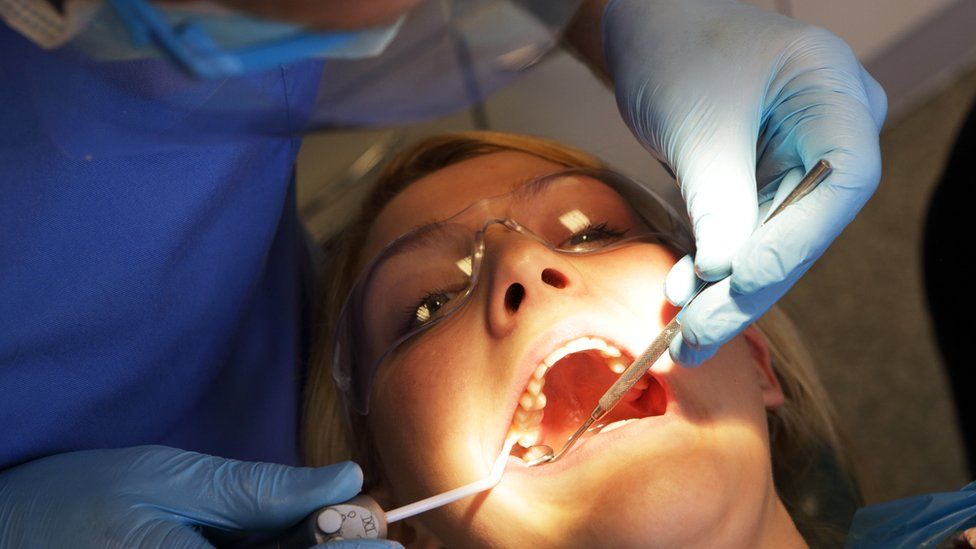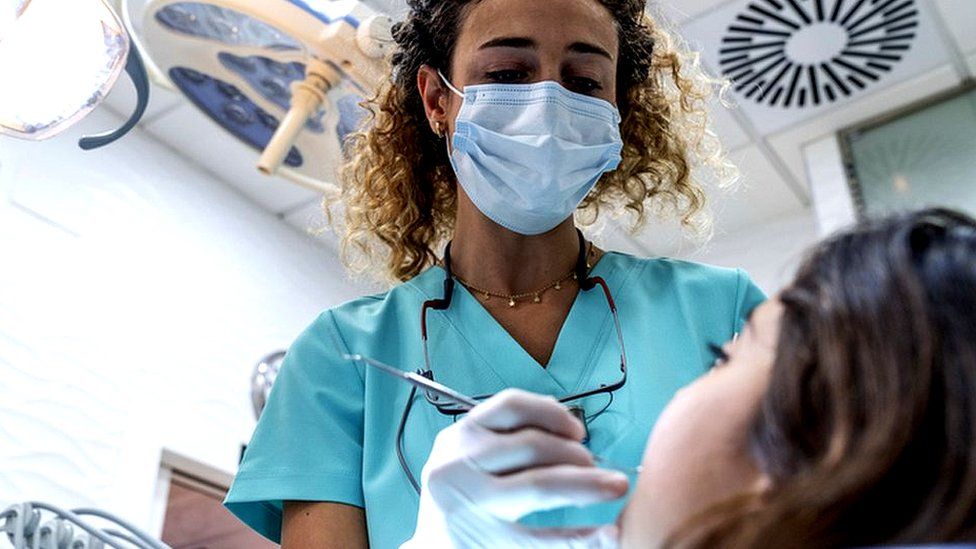
Dentists who set up practice in areas of England with poor access to NHS care will be offered a £20,000 bonus.
The government has also announced higher payments for dentists who take on new patients and teeth-cleaning in schools as part of a plan to expand levels of dental care.
The plans have been criticised as not going far enough by dental leaders and Labour.
The British Dentistry Association said this is "rearranging the deckchairs".
The government hopes the extra cash will encourage dentists to take on more NHS patients rather than private work, estimating 1.5 million more treatments will be given over the next 12 months.
Health Secretary Victoria Atkins said she recognised how frustrating it was not being able to access an NHS dentist.
She continued: "I'm determined to deliver faster, simpler and fairer access to NHS dentistry for patients. This plan will help."
While the £20,000 "golden hello" bonus is aimed at getting more dentists to work for three years in the so-called dental deserts where there is the poorest access to NHS care, the government says top-up payments will be crucial to improving access across the board.
The payment will be available to up to 240 dentists, about 1% of the workforce.
British Dental Association (BDA) leader Shawn Charlwood said: "This 'recovery plan' is not worthy of the title. It won't halt the exodus from the workforce or offer hope to millions struggling to access care.
"Nothing here makes this service fit for the future. The crisis will remain a burning issue in communities across this country until we get real change."
The measures announced by the government also include:
- An extra £15 for dentists on top of the standard payment of £28 for seeing a patient who has not visited a dentist for two years
- An increase of up to £50 per patient needing complex work
- Dental teams visiting schools and nurseries to provide fluoride varnish treatments and supported teeth-brushing
- Mobile dental services in rural and coastal areas with poor dental coverage
- Expansion of water fluoridation to new parts of the country to help prevent tooth decay

To support the proposal, an extra £200m will be invested on top of the £3bn currently spent each year.
However, the BDA said spending on dentistry had dropped by £1bn since 2010 once inflation was taken into account.
Labour's shadow health secretary Wes Streeting told BBC Breakfast the proposals are "temporary measures they hope can buy them time until after the election".
He said he wouldn't criticise the idea of channelling extra money into areas worst served by NHS dentists, such as south-west and north-west England.
But he added: "Not all of the problems in the NHS are about money, but with dentistry a lot of is about money. Last year there was a £400m underspend in the NHS dentistry budget. Can you believe it? With people struggling to get access to dentists and contract reform so desperately needed."
The party has previously announced its own policy of supervised teeth-brushing for three-to-five-year-olds and Mr Streeting said it would reform the contract system for dentists immediately if it wins an election.
Last year 32.5 million treatments were carried out - but that is still fewer than before the pandemic.
Achieving that depends on tempting current dentists into doing more NHS work instead of private work - something the British Dental Association (BDA) does not think is guaranteed.
Dentist training posts are in the process of being increased, but that will take some years to start making a significant difference.
Dental surgeon Dr Sami Butt told Radio 4's Today programme the payment would be an insufficient measure without wider reforms, describing it as a "temporary filling - and not a very good one".
Louise Ansari, head of Healthwatch England, said there were "major access issues", which the rising cost of living had also had a big impact on.
She the plan was a "good start", but in the long term more radical solutions were needed.
The state of NHS dentistry was recently thrust into the spotlight when hundreds of people queued outside a new dental practice in Bristol to register as NHS patients.
And a BBC investigation in 2022 found nine in 10 NHS dental practices across the UK were not accepting new adult patients for treatment on the NHS.
It found the lack of NHS appointments had led people to drive hundreds of miles in search of treatment, pull out their own teeth without anaesthesia, or resort to making their own improvised dentures.


How difficult is it for you to gain access to an NHS dentist and how have you coped without one? Tell us your story by emailing: haveyoursay@bbc.co.uk.
Please include a contact number if you are willing to speak to a BBC journalist. You can also get in touch in the following ways:
- WhatsApp: +44 7756 165803
- Tweet: @BBC_HaveYourSay
- Upload your photos/videos here
- Or fill out the form below
- Please read our terms & conditions and privacy policy
If you are reading this page and can't see the form you will need to visit the mobile version of the BBC website to submit your question or comment or you can email us at HaveYourSay@bbc.co.uk. Please include your name, age and location with any submission.
Related Topics
Related Internet Links
https://news.google.com/rss/articles/CBMiKmh0dHBzOi8vd3d3LmJiYy5jby51ay9uZXdzL2hlYWx0aC02ODE3MTE3MdIBLmh0dHBzOi8vd3d3LmJiYy5jby51ay9uZXdzL2hlYWx0aC02ODE3MTE3MS5hbXA?oc=5
2024-02-07 07:20:14Z
CBMiKmh0dHBzOi8vd3d3LmJiYy5jby51ay9uZXdzL2hlYWx0aC02ODE3MTE3MdIBLmh0dHBzOi8vd3d3LmJiYy5jby51ay9uZXdzL2hlYWx0aC02ODE3MTE3MS5hbXA
Tidak ada komentar:
Posting Komentar